Semester 2 NRSG370 Clinical Integration: Modules 1 & 2 Assignment
VerifiedAdded on 2023/06/04
|8
|1961
|394
Homework Assignment
AI Summary
This assignment explores critical aspects of nursing practice, focusing on safety, legal responsibilities, and confidentiality within a rehabilitation center setting. Module 1 delves into the impact of shift work and long working hours on nurses' well-being, highlighting issues such as sleep disturbances, increased risk of injuries, and the impact on family life and social functions. The assignment emphasizes the need for interventions like rest breaks, light therapy, and mental health support to mitigate these challenges and ensure patient safety. Module 2 examines the ethical dilemma of confidentiality, discussing the importance of protecting patient information while balancing the need to involve carers in the treatment process. The assignment explores the legal and ethical obligations of nurses, the barriers to sharing information, and the strategies to address the dilemma through open communication and respect for patient preferences. The assignment references relevant research to support its arguments and provides a comprehensive overview of the key issues in nursing practice.
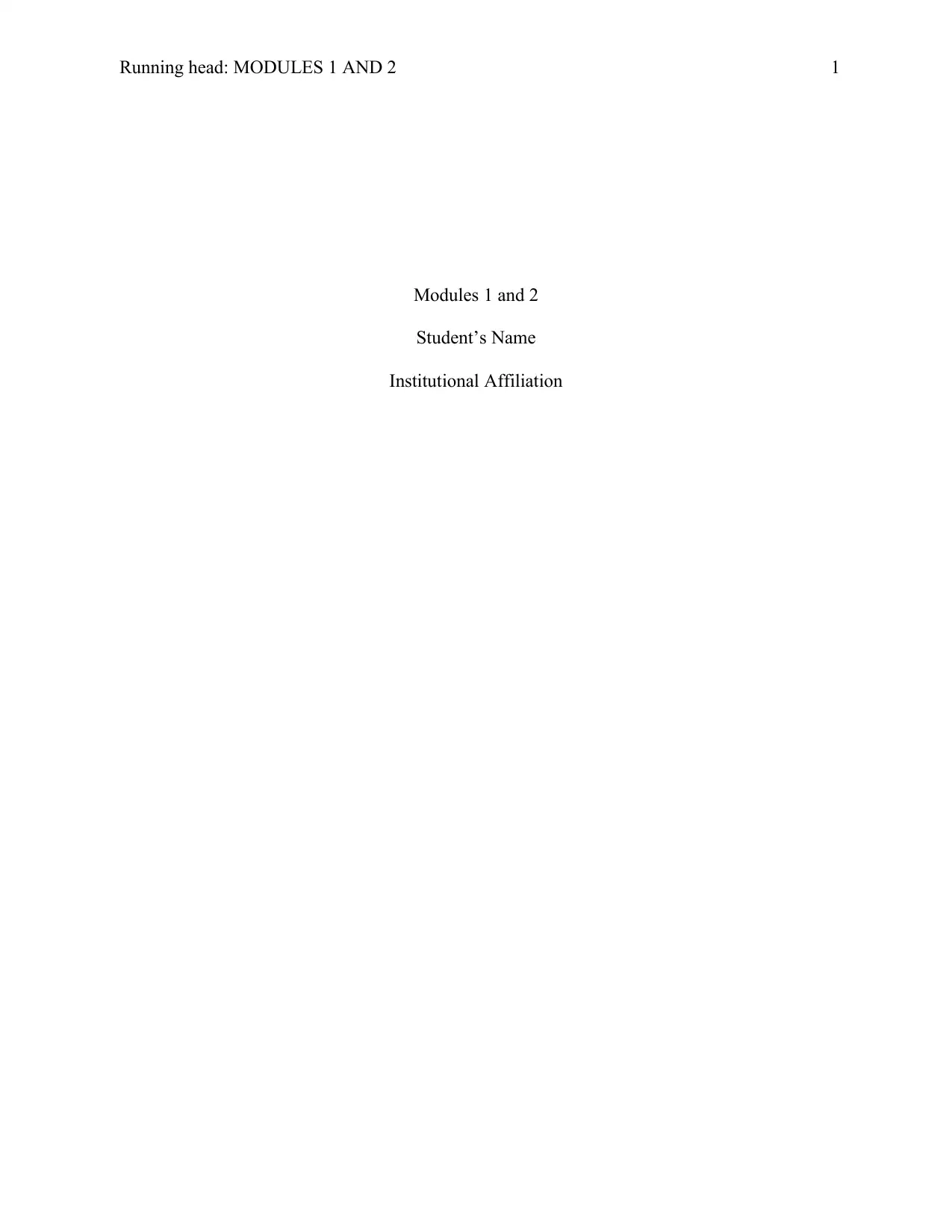
Running head: MODULES 1 AND 2 1
Modules 1 and 2
Student’s Name
Institutional Affiliation
Modules 1 and 2
Student’s Name
Institutional Affiliation
Paraphrase This Document
Need a fresh take? Get an instant paraphrase of this document with our AI Paraphraser
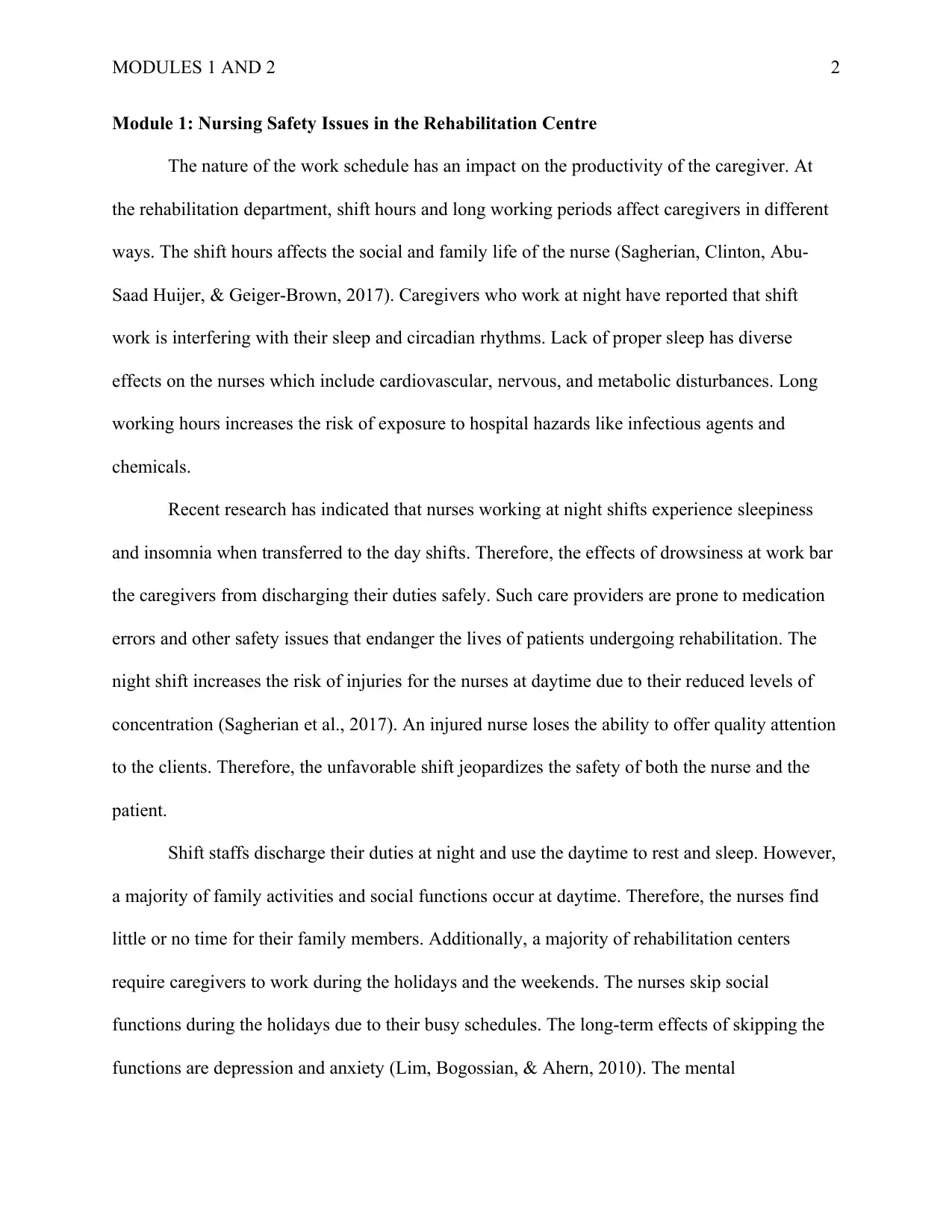
MODULES 1 AND 2 2
Module 1: Nursing Safety Issues in the Rehabilitation Centre
The nature of the work schedule has an impact on the productivity of the caregiver. At
the rehabilitation department, shift hours and long working periods affect caregivers in different
ways. The shift hours affects the social and family life of the nurse (Sagherian, Clinton, Abu-
Saad Huijer, & Geiger-Brown, 2017). Caregivers who work at night have reported that shift
work is interfering with their sleep and circadian rhythms. Lack of proper sleep has diverse
effects on the nurses which include cardiovascular, nervous, and metabolic disturbances. Long
working hours increases the risk of exposure to hospital hazards like infectious agents and
chemicals.
Recent research has indicated that nurses working at night shifts experience sleepiness
and insomnia when transferred to the day shifts. Therefore, the effects of drowsiness at work bar
the caregivers from discharging their duties safely. Such care providers are prone to medication
errors and other safety issues that endanger the lives of patients undergoing rehabilitation. The
night shift increases the risk of injuries for the nurses at daytime due to their reduced levels of
concentration (Sagherian et al., 2017). An injured nurse loses the ability to offer quality attention
to the clients. Therefore, the unfavorable shift jeopardizes the safety of both the nurse and the
patient.
Shift staffs discharge their duties at night and use the daytime to rest and sleep. However,
a majority of family activities and social functions occur at daytime. Therefore, the nurses find
little or no time for their family members. Additionally, a majority of rehabilitation centers
require caregivers to work during the holidays and the weekends. The nurses skip social
functions during the holidays due to their busy schedules. The long-term effects of skipping the
functions are depression and anxiety (Lim, Bogossian, & Ahern, 2010). The mental
Module 1: Nursing Safety Issues in the Rehabilitation Centre
The nature of the work schedule has an impact on the productivity of the caregiver. At
the rehabilitation department, shift hours and long working periods affect caregivers in different
ways. The shift hours affects the social and family life of the nurse (Sagherian, Clinton, Abu-
Saad Huijer, & Geiger-Brown, 2017). Caregivers who work at night have reported that shift
work is interfering with their sleep and circadian rhythms. Lack of proper sleep has diverse
effects on the nurses which include cardiovascular, nervous, and metabolic disturbances. Long
working hours increases the risk of exposure to hospital hazards like infectious agents and
chemicals.
Recent research has indicated that nurses working at night shifts experience sleepiness
and insomnia when transferred to the day shifts. Therefore, the effects of drowsiness at work bar
the caregivers from discharging their duties safely. Such care providers are prone to medication
errors and other safety issues that endanger the lives of patients undergoing rehabilitation. The
night shift increases the risk of injuries for the nurses at daytime due to their reduced levels of
concentration (Sagherian et al., 2017). An injured nurse loses the ability to offer quality attention
to the clients. Therefore, the unfavorable shift jeopardizes the safety of both the nurse and the
patient.
Shift staffs discharge their duties at night and use the daytime to rest and sleep. However,
a majority of family activities and social functions occur at daytime. Therefore, the nurses find
little or no time for their family members. Additionally, a majority of rehabilitation centers
require caregivers to work during the holidays and the weekends. The nurses skip social
functions during the holidays due to their busy schedules. The long-term effects of skipping the
functions are depression and anxiety (Lim, Bogossian, & Ahern, 2010). The mental
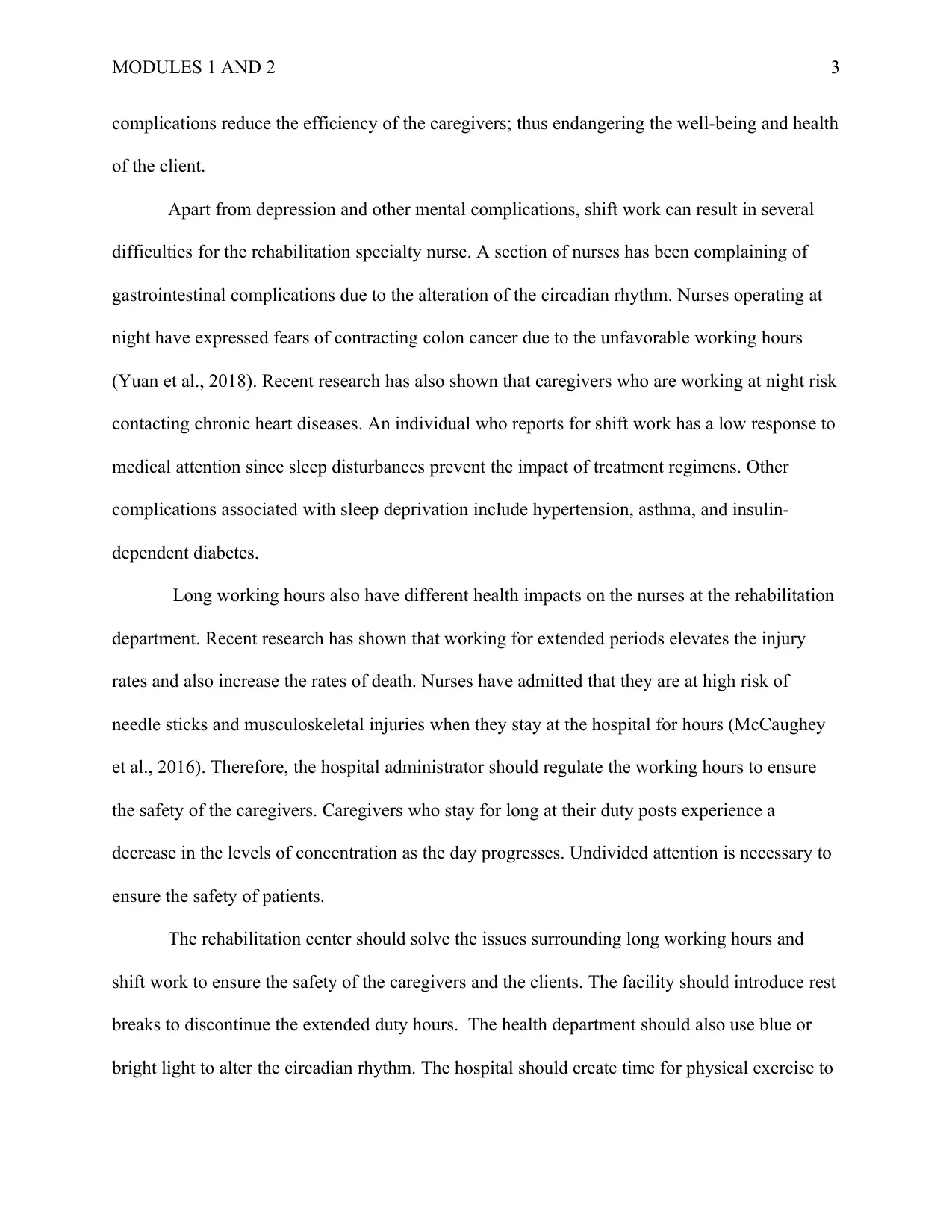
MODULES 1 AND 2 3
complications reduce the efficiency of the caregivers; thus endangering the well-being and health
of the client.
Apart from depression and other mental complications, shift work can result in several
difficulties for the rehabilitation specialty nurse. A section of nurses has been complaining of
gastrointestinal complications due to the alteration of the circadian rhythm. Nurses operating at
night have expressed fears of contracting colon cancer due to the unfavorable working hours
(Yuan et al., 2018). Recent research has also shown that caregivers who are working at night risk
contacting chronic heart diseases. An individual who reports for shift work has a low response to
medical attention since sleep disturbances prevent the impact of treatment regimens. Other
complications associated with sleep deprivation include hypertension, asthma, and insulin-
dependent diabetes.
Long working hours also have different health impacts on the nurses at the rehabilitation
department. Recent research has shown that working for extended periods elevates the injury
rates and also increase the rates of death. Nurses have admitted that they are at high risk of
needle sticks and musculoskeletal injuries when they stay at the hospital for hours (McCaughey
et al., 2016). Therefore, the hospital administrator should regulate the working hours to ensure
the safety of the caregivers. Caregivers who stay for long at their duty posts experience a
decrease in the levels of concentration as the day progresses. Undivided attention is necessary to
ensure the safety of patients.
The rehabilitation center should solve the issues surrounding long working hours and
shift work to ensure the safety of the caregivers and the clients. The facility should introduce rest
breaks to discontinue the extended duty hours. The health department should also use blue or
bright light to alter the circadian rhythm. The hospital should create time for physical exercise to
complications reduce the efficiency of the caregivers; thus endangering the well-being and health
of the client.
Apart from depression and other mental complications, shift work can result in several
difficulties for the rehabilitation specialty nurse. A section of nurses has been complaining of
gastrointestinal complications due to the alteration of the circadian rhythm. Nurses operating at
night have expressed fears of contracting colon cancer due to the unfavorable working hours
(Yuan et al., 2018). Recent research has also shown that caregivers who are working at night risk
contacting chronic heart diseases. An individual who reports for shift work has a low response to
medical attention since sleep disturbances prevent the impact of treatment regimens. Other
complications associated with sleep deprivation include hypertension, asthma, and insulin-
dependent diabetes.
Long working hours also have different health impacts on the nurses at the rehabilitation
department. Recent research has shown that working for extended periods elevates the injury
rates and also increase the rates of death. Nurses have admitted that they are at high risk of
needle sticks and musculoskeletal injuries when they stay at the hospital for hours (McCaughey
et al., 2016). Therefore, the hospital administrator should regulate the working hours to ensure
the safety of the caregivers. Caregivers who stay for long at their duty posts experience a
decrease in the levels of concentration as the day progresses. Undivided attention is necessary to
ensure the safety of patients.
The rehabilitation center should solve the issues surrounding long working hours and
shift work to ensure the safety of the caregivers and the clients. The facility should introduce rest
breaks to discontinue the extended duty hours. The health department should also use blue or
bright light to alter the circadian rhythm. The hospital should create time for physical exercise to
⊘ This is a preview!⊘
Do you want full access?
Subscribe today to unlock all pages.

Trusted by 1+ million students worldwide
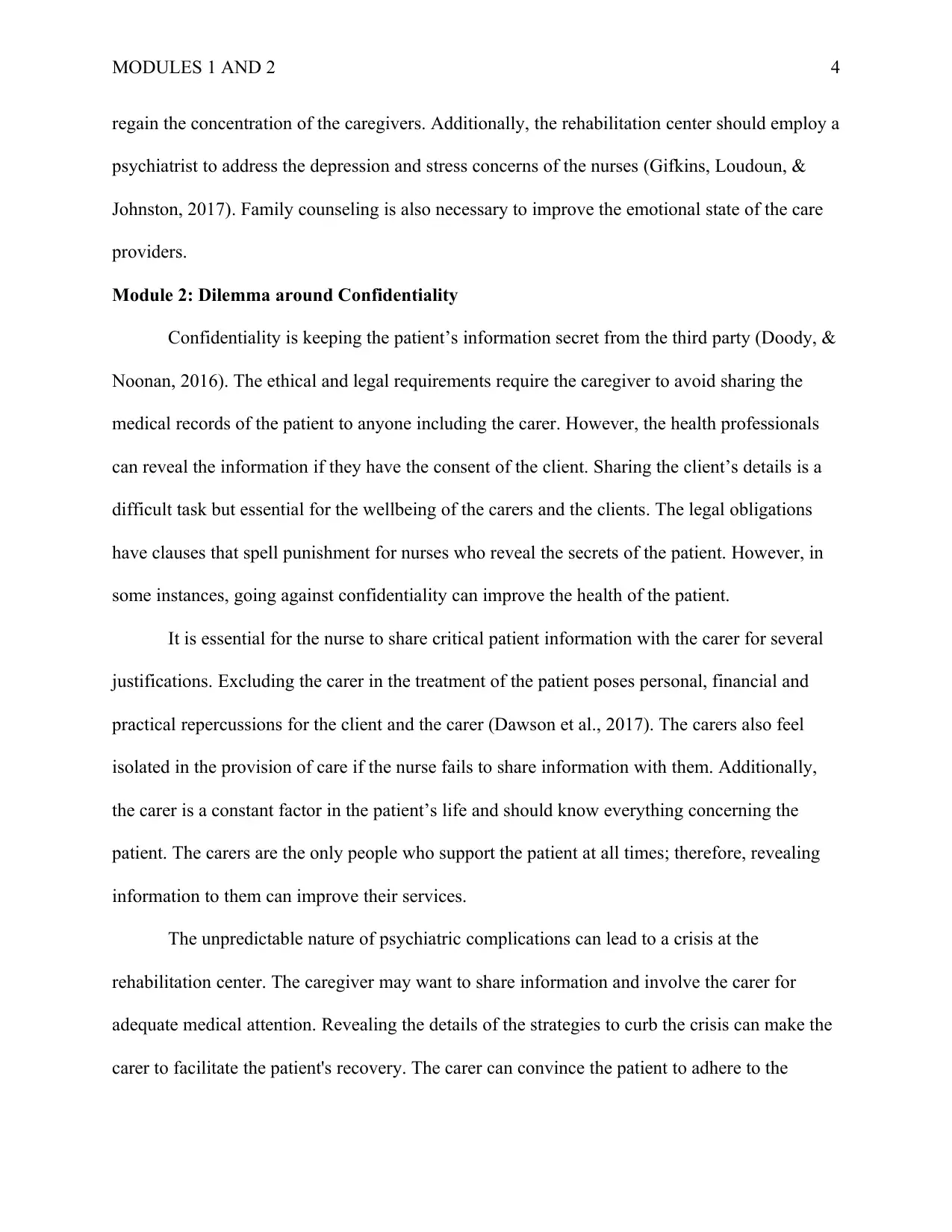
MODULES 1 AND 2 4
regain the concentration of the caregivers. Additionally, the rehabilitation center should employ a
psychiatrist to address the depression and stress concerns of the nurses (Gifkins, Loudoun, &
Johnston, 2017). Family counseling is also necessary to improve the emotional state of the care
providers.
Module 2: Dilemma around Confidentiality
Confidentiality is keeping the patient’s information secret from the third party (Doody, &
Noonan, 2016). The ethical and legal requirements require the caregiver to avoid sharing the
medical records of the patient to anyone including the carer. However, the health professionals
can reveal the information if they have the consent of the client. Sharing the client’s details is a
difficult task but essential for the wellbeing of the carers and the clients. The legal obligations
have clauses that spell punishment for nurses who reveal the secrets of the patient. However, in
some instances, going against confidentiality can improve the health of the patient.
It is essential for the nurse to share critical patient information with the carer for several
justifications. Excluding the carer in the treatment of the patient poses personal, financial and
practical repercussions for the client and the carer (Dawson et al., 2017). The carers also feel
isolated in the provision of care if the nurse fails to share information with them. Additionally,
the carer is a constant factor in the patient’s life and should know everything concerning the
patient. The carers are the only people who support the patient at all times; therefore, revealing
information to them can improve their services.
The unpredictable nature of psychiatric complications can lead to a crisis at the
rehabilitation center. The caregiver may want to share information and involve the carer for
adequate medical attention. Revealing the details of the strategies to curb the crisis can make the
carer to facilitate the patient's recovery. The carer can convince the patient to adhere to the
regain the concentration of the caregivers. Additionally, the rehabilitation center should employ a
psychiatrist to address the depression and stress concerns of the nurses (Gifkins, Loudoun, &
Johnston, 2017). Family counseling is also necessary to improve the emotional state of the care
providers.
Module 2: Dilemma around Confidentiality
Confidentiality is keeping the patient’s information secret from the third party (Doody, &
Noonan, 2016). The ethical and legal requirements require the caregiver to avoid sharing the
medical records of the patient to anyone including the carer. However, the health professionals
can reveal the information if they have the consent of the client. Sharing the client’s details is a
difficult task but essential for the wellbeing of the carers and the clients. The legal obligations
have clauses that spell punishment for nurses who reveal the secrets of the patient. However, in
some instances, going against confidentiality can improve the health of the patient.
It is essential for the nurse to share critical patient information with the carer for several
justifications. Excluding the carer in the treatment of the patient poses personal, financial and
practical repercussions for the client and the carer (Dawson et al., 2017). The carers also feel
isolated in the provision of care if the nurse fails to share information with them. Additionally,
the carer is a constant factor in the patient’s life and should know everything concerning the
patient. The carers are the only people who support the patient at all times; therefore, revealing
information to them can improve their services.
The unpredictable nature of psychiatric complications can lead to a crisis at the
rehabilitation center. The caregiver may want to share information and involve the carer for
adequate medical attention. Revealing the details of the strategies to curb the crisis can make the
carer to facilitate the patient's recovery. The carer can convince the patient to adhere to the
Paraphrase This Document
Need a fresh take? Get an instant paraphrase of this document with our AI Paraphraser
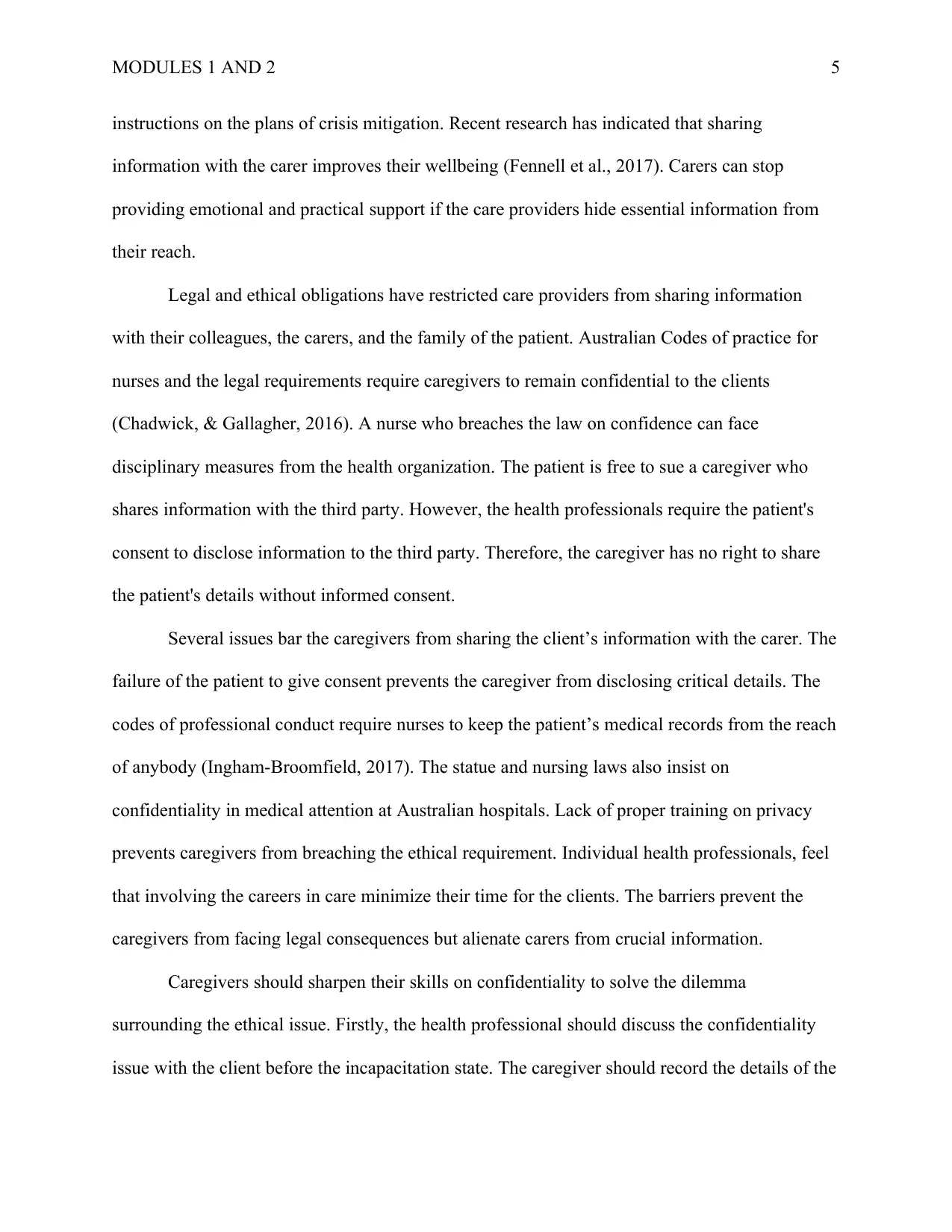
MODULES 1 AND 2 5
instructions on the plans of crisis mitigation. Recent research has indicated that sharing
information with the carer improves their wellbeing (Fennell et al., 2017). Carers can stop
providing emotional and practical support if the care providers hide essential information from
their reach.
Legal and ethical obligations have restricted care providers from sharing information
with their colleagues, the carers, and the family of the patient. Australian Codes of practice for
nurses and the legal requirements require caregivers to remain confidential to the clients
(Chadwick, & Gallagher, 2016). A nurse who breaches the law on confidence can face
disciplinary measures from the health organization. The patient is free to sue a caregiver who
shares information with the third party. However, the health professionals require the patient's
consent to disclose information to the third party. Therefore, the caregiver has no right to share
the patient's details without informed consent.
Several issues bar the caregivers from sharing the client’s information with the carer. The
failure of the patient to give consent prevents the caregiver from disclosing critical details. The
codes of professional conduct require nurses to keep the patient’s medical records from the reach
of anybody (Ingham-Broomfield, 2017). The statue and nursing laws also insist on
confidentiality in medical attention at Australian hospitals. Lack of proper training on privacy
prevents caregivers from breaching the ethical requirement. Individual health professionals, feel
that involving the careers in care minimize their time for the clients. The barriers prevent the
caregivers from facing legal consequences but alienate carers from crucial information.
Caregivers should sharpen their skills on confidentiality to solve the dilemma
surrounding the ethical issue. Firstly, the health professional should discuss the confidentiality
issue with the client before the incapacitation state. The caregiver should record the details of the
instructions on the plans of crisis mitigation. Recent research has indicated that sharing
information with the carer improves their wellbeing (Fennell et al., 2017). Carers can stop
providing emotional and practical support if the care providers hide essential information from
their reach.
Legal and ethical obligations have restricted care providers from sharing information
with their colleagues, the carers, and the family of the patient. Australian Codes of practice for
nurses and the legal requirements require caregivers to remain confidential to the clients
(Chadwick, & Gallagher, 2016). A nurse who breaches the law on confidence can face
disciplinary measures from the health organization. The patient is free to sue a caregiver who
shares information with the third party. However, the health professionals require the patient's
consent to disclose information to the third party. Therefore, the caregiver has no right to share
the patient's details without informed consent.
Several issues bar the caregivers from sharing the client’s information with the carer. The
failure of the patient to give consent prevents the caregiver from disclosing critical details. The
codes of professional conduct require nurses to keep the patient’s medical records from the reach
of anybody (Ingham-Broomfield, 2017). The statue and nursing laws also insist on
confidentiality in medical attention at Australian hospitals. Lack of proper training on privacy
prevents caregivers from breaching the ethical requirement. Individual health professionals, feel
that involving the careers in care minimize their time for the clients. The barriers prevent the
caregivers from facing legal consequences but alienate carers from crucial information.
Caregivers should sharpen their skills on confidentiality to solve the dilemma
surrounding the ethical issue. Firstly, the health professional should discuss the confidentiality
issue with the client before the incapacitation state. The caregiver should record the details of the
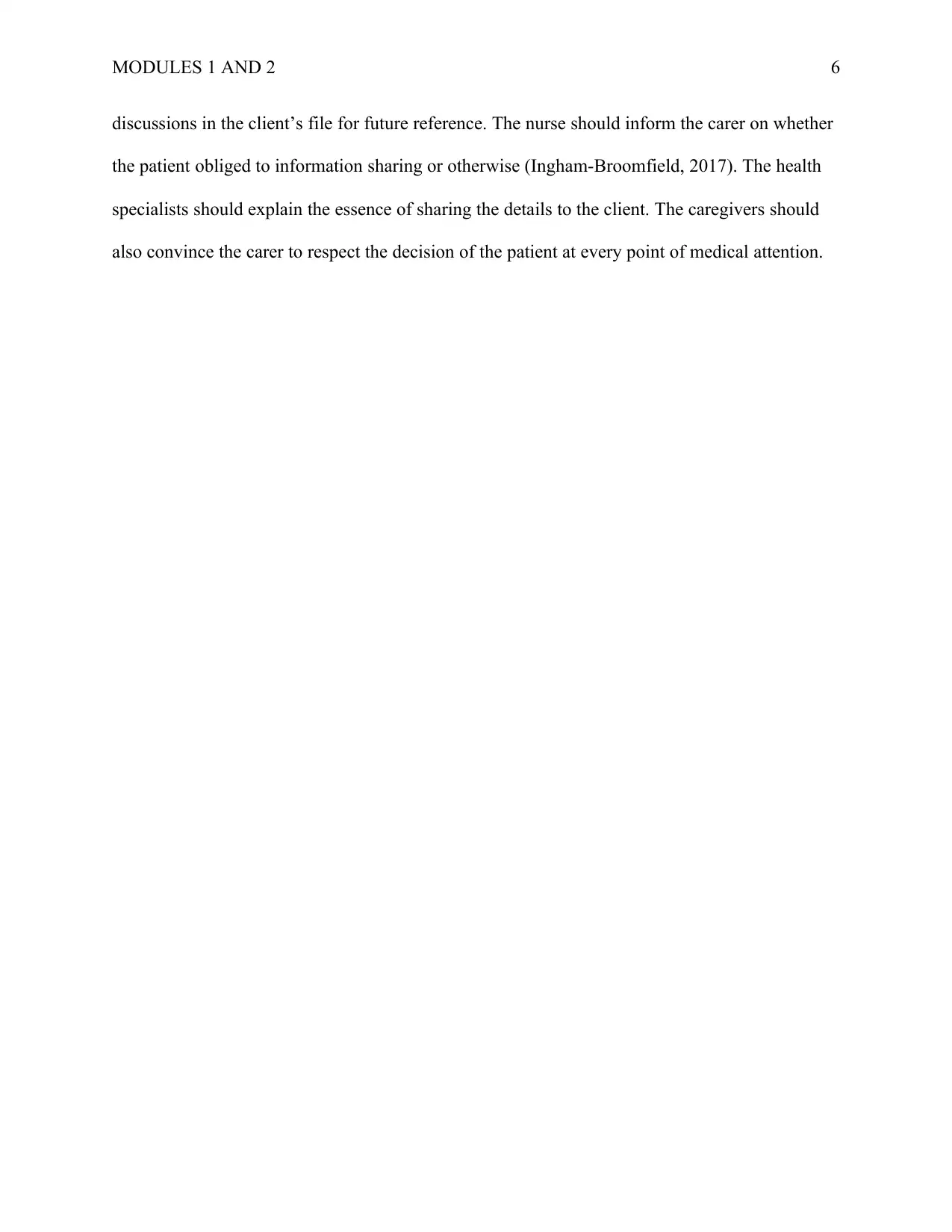
MODULES 1 AND 2 6
discussions in the client’s file for future reference. The nurse should inform the carer on whether
the patient obliged to information sharing or otherwise (Ingham-Broomfield, 2017). The health
specialists should explain the essence of sharing the details to the client. The caregivers should
also convince the carer to respect the decision of the patient at every point of medical attention.
discussions in the client’s file for future reference. The nurse should inform the carer on whether
the patient obliged to information sharing or otherwise (Ingham-Broomfield, 2017). The health
specialists should explain the essence of sharing the details to the client. The caregivers should
also convince the carer to respect the decision of the patient at every point of medical attention.
⊘ This is a preview!⊘
Do you want full access?
Subscribe today to unlock all pages.

Trusted by 1+ million students worldwide
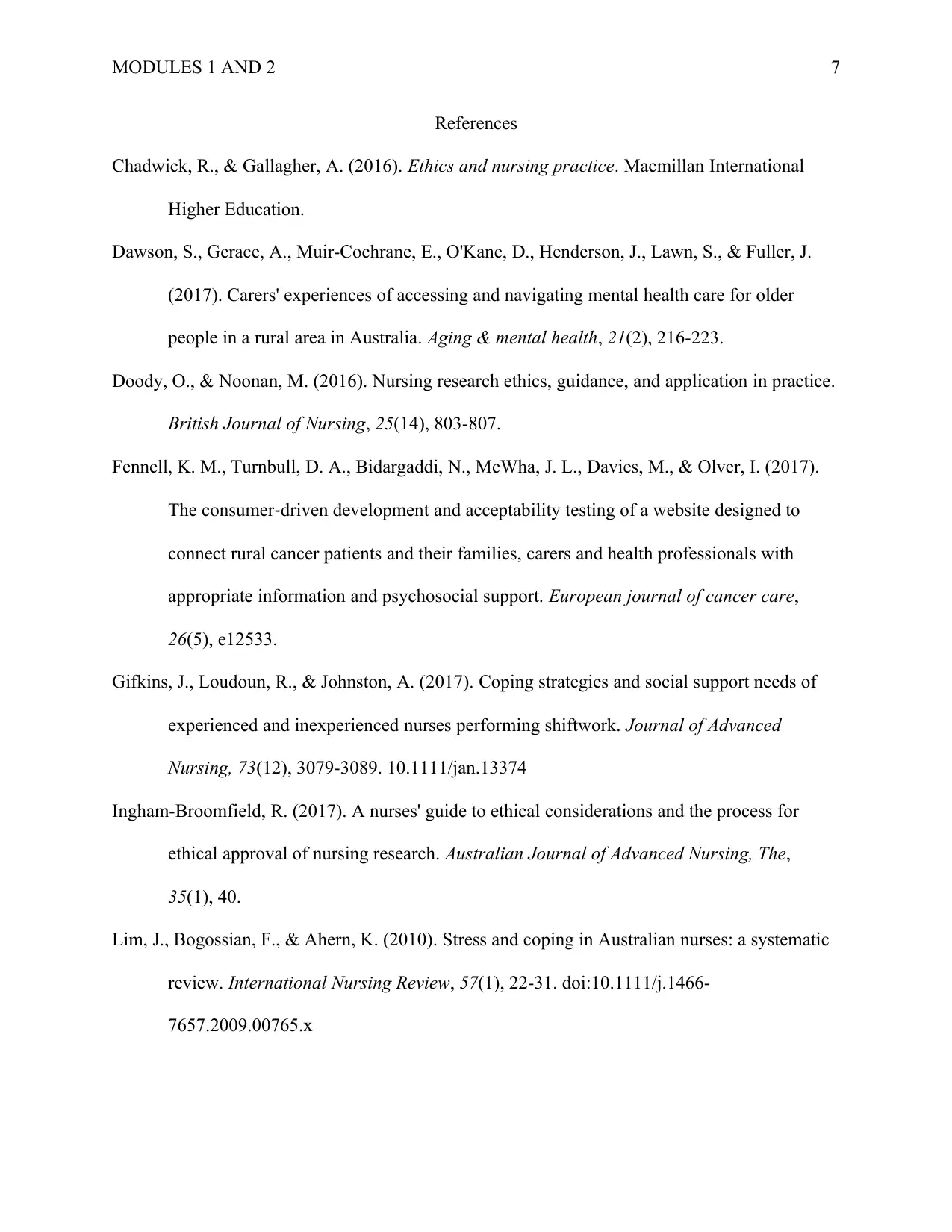
MODULES 1 AND 2 7
References
Chadwick, R., & Gallagher, A. (2016). Ethics and nursing practice. Macmillan International
Higher Education.
Dawson, S., Gerace, A., Muir-Cochrane, E., O'Kane, D., Henderson, J., Lawn, S., & Fuller, J.
(2017). Carers' experiences of accessing and navigating mental health care for older
people in a rural area in Australia. Aging & mental health, 21(2), 216-223.
Doody, O., & Noonan, M. (2016). Nursing research ethics, guidance, and application in practice.
British Journal of Nursing, 25(14), 803-807.
Fennell, K. M., Turnbull, D. A., Bidargaddi, N., McWha, J. L., Davies, M., & Olver, I. (2017).
The consumer‐driven development and acceptability testing of a website designed to
connect rural cancer patients and their families, carers and health professionals with
appropriate information and psychosocial support. European journal of cancer care,
26(5), e12533.
Gifkins, J., Loudoun, R., & Johnston, A. (2017). Coping strategies and social support needs of
experienced and inexperienced nurses performing shiftwork. Journal of Advanced
Nursing, 73(12), 3079-3089. 10.1111/jan.13374
Ingham-Broomfield, R. (2017). A nurses' guide to ethical considerations and the process for
ethical approval of nursing research. Australian Journal of Advanced Nursing, The,
35(1), 40.
Lim, J., Bogossian, F., & Ahern, K. (2010). Stress and coping in Australian nurses: a systematic
review. International Nursing Review, 57(1), 22-31. doi:10.1111/j.1466-
7657.2009.00765.x
References
Chadwick, R., & Gallagher, A. (2016). Ethics and nursing practice. Macmillan International
Higher Education.
Dawson, S., Gerace, A., Muir-Cochrane, E., O'Kane, D., Henderson, J., Lawn, S., & Fuller, J.
(2017). Carers' experiences of accessing and navigating mental health care for older
people in a rural area in Australia. Aging & mental health, 21(2), 216-223.
Doody, O., & Noonan, M. (2016). Nursing research ethics, guidance, and application in practice.
British Journal of Nursing, 25(14), 803-807.
Fennell, K. M., Turnbull, D. A., Bidargaddi, N., McWha, J. L., Davies, M., & Olver, I. (2017).
The consumer‐driven development and acceptability testing of a website designed to
connect rural cancer patients and their families, carers and health professionals with
appropriate information and psychosocial support. European journal of cancer care,
26(5), e12533.
Gifkins, J., Loudoun, R., & Johnston, A. (2017). Coping strategies and social support needs of
experienced and inexperienced nurses performing shiftwork. Journal of Advanced
Nursing, 73(12), 3079-3089. 10.1111/jan.13374
Ingham-Broomfield, R. (2017). A nurses' guide to ethical considerations and the process for
ethical approval of nursing research. Australian Journal of Advanced Nursing, The,
35(1), 40.
Lim, J., Bogossian, F., & Ahern, K. (2010). Stress and coping in Australian nurses: a systematic
review. International Nursing Review, 57(1), 22-31. doi:10.1111/j.1466-
7657.2009.00765.x
Paraphrase This Document
Need a fresh take? Get an instant paraphrase of this document with our AI Paraphraser
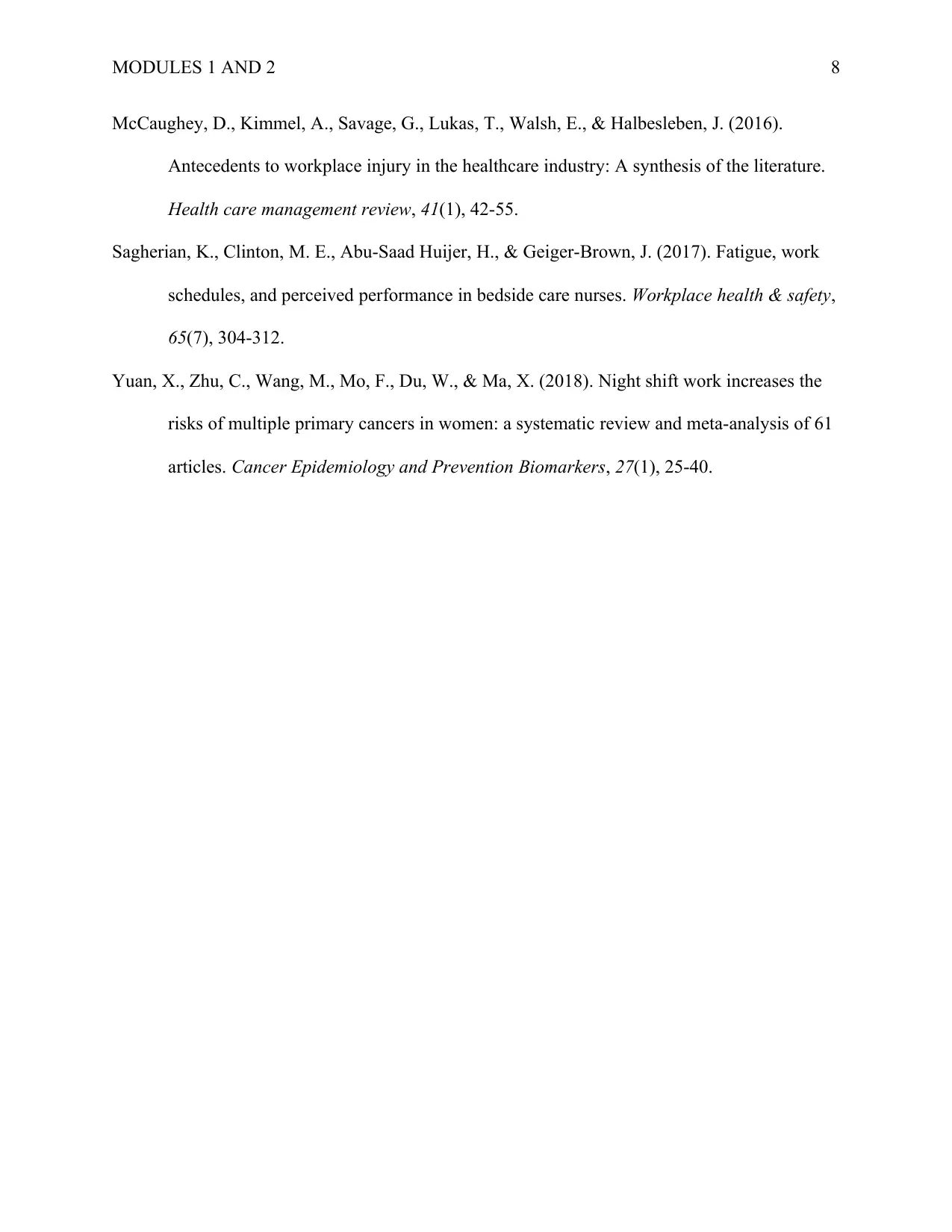
MODULES 1 AND 2 8
McCaughey, D., Kimmel, A., Savage, G., Lukas, T., Walsh, E., & Halbesleben, J. (2016).
Antecedents to workplace injury in the healthcare industry: A synthesis of the literature.
Health care management review, 41(1), 42-55.
Sagherian, K., Clinton, M. E., Abu-Saad Huijer, H., & Geiger-Brown, J. (2017). Fatigue, work
schedules, and perceived performance in bedside care nurses. Workplace health & safety,
65(7), 304-312.
Yuan, X., Zhu, C., Wang, M., Mo, F., Du, W., & Ma, X. (2018). Night shift work increases the
risks of multiple primary cancers in women: a systematic review and meta-analysis of 61
articles. Cancer Epidemiology and Prevention Biomarkers, 27(1), 25-40.
McCaughey, D., Kimmel, A., Savage, G., Lukas, T., Walsh, E., & Halbesleben, J. (2016).
Antecedents to workplace injury in the healthcare industry: A synthesis of the literature.
Health care management review, 41(1), 42-55.
Sagherian, K., Clinton, M. E., Abu-Saad Huijer, H., & Geiger-Brown, J. (2017). Fatigue, work
schedules, and perceived performance in bedside care nurses. Workplace health & safety,
65(7), 304-312.
Yuan, X., Zhu, C., Wang, M., Mo, F., Du, W., & Ma, X. (2018). Night shift work increases the
risks of multiple primary cancers in women: a systematic review and meta-analysis of 61
articles. Cancer Epidemiology and Prevention Biomarkers, 27(1), 25-40.
1 out of 8
Your All-in-One AI-Powered Toolkit for Academic Success.
+13062052269
info@desklib.com
Available 24*7 on WhatsApp / Email
![[object Object]](/_next/static/media/star-bottom.7253800d.svg)
Unlock your academic potential
Copyright © 2020–2026 A2Z Services. All Rights Reserved. Developed and managed by ZUCOL.

